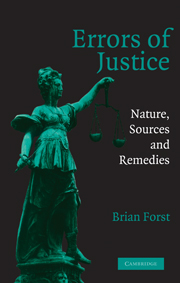Book contents
- Frontmatter
- Contents
- Preface
- Acknowledgments
- 1 The Problem
- 2 Errors of Due Process
- 3 Errors of Impunity
- 4 Frameworks for Analyzing the Incidence of Justice Errors
- 5 Assessing the Cost of Justice Errors
- 6 Standards of Evidence
- 7 Police-Induced Errors
- 8 Prosecution Policy and Justice Errors
- 9 The Jury
- 10 Sentencing and Corrections
- 11 Homicide
- 12 A Matter of Legitimacy
- Bibliography
- Index
- Titles in the series
1 - The Problem
Published online by Cambridge University Press: 05 July 2011
- Frontmatter
- Contents
- Preface
- Acknowledgments
- 1 The Problem
- 2 Errors of Due Process
- 3 Errors of Impunity
- 4 Frameworks for Analyzing the Incidence of Justice Errors
- 5 Assessing the Cost of Justice Errors
- 6 Standards of Evidence
- 7 Police-Induced Errors
- 8 Prosecution Policy and Justice Errors
- 9 The Jury
- 10 Sentencing and Corrections
- 11 Homicide
- 12 A Matter of Legitimacy
- Bibliography
- Index
- Titles in the series
Summary
The logic now in use serves rather to fix and give stability to the errors which have their foundation in commonly received notions than to help the search after truth. So it does more harm than good.
— Francis Bacon (1620)Introduction
Conventional assessments of the criminal justice system, its practices and policies have long been afflicted by a serious blind spot. Scholars and criminal justice practitioners typically assess justice policies in terms of their effects on crime and recidivism rates, fear of crime, equitability, costs, and levels of public satisfaction. These criteria all have considerable merit and appeal, but the recent discovery of a large number of death sentences imposed on innocent people raises fundamental questions about the comprehensiveness of conventional assessments. This discovery appears to have done more to alter attitudes and policies regarding the death penalty than all other empirically based arguments against capital punishment, including the absence of systematic evidence of a deterrent effect and findings of racial disparity in its application. In 2003, outgoing Governor George Ryan commuted the death sentences of all 156 Illinois death row inmates on the grounds that they had been sentenced under a system that was “haunted by the demon of error.”
Errors of justice — both the errors of harassing and sanctioning innocent people and those of failure to sanction culpable offenders — do much more than undermine the case for capital punishment.
- Type
- Chapter
- Information
- Errors of JusticeNature, Sources and Remedies, pp. 1 - 9Publisher: Cambridge University PressPrint publication year: 2003



